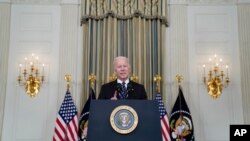The United States is calling the attempted assassination of Iraq's prime minister an attack on "the sovereignty and stability of the Iraqi state" and admits the nature of the attack likely points to groups connected to Iran.
Iraqi Prime Minister Mustafa al-Kadhimi escaped Sunday's attack — by armed drones, as described by Iraqi security officials — with just minor injuries, and he quickly called for calm.
"Cowardly rocket and drone attacks don't build homelands and don't build a future," al-Kadhimi said in a televised address shortly after the attack, which was quickly condemned by U.S. President Joe Biden.
On Monday, the U.S. State Department and the Pentagon echoed the president's condemnation, warning that the Iraqi prime minister was likely not the only intended target.
"We believe that this was an attack not only on him but also on the sovereignty and stability of the Iraqi state," State Department spokesman Ned Price told reporters.
"Prime Minister Kadhimi represents not only the head of government, but he represents the state of Iraq, and he is the commander in chief of Iraqi security forces," Price added.
No one has claimed responsibility for the attack, but Iraqi security sources told the Reuters news agency that the strike was likely carried out by at least one Iran-backed militia.
The officials, who spoke on the condition of anonymity, said the initial investigation determined that both the drones used in the attack and the explosives were made in Iran.
One paramilitary group contacted by Reuters declined to address the allegations. Other groups could not be reached for comment.
Separately Monday, Iran's Foreign Ministry spokesman told a news conference in Tehran, "Everyone must help so the culprits and orchestrators of this (attack) are found."
"The path to stability in Iraq relies on such cooperation and the rule of law," said Saeed Khatibzadeh. "We must accommodate good conditions so the appropriate Iraqi legal organizations can perform their necessary investigations."
U.S. officials Monday declined to comment directly on responsibility for the attack but admitted the use of drones could point to groups with ties to Iran.
"There are multiple groups operating inside Iraq that are backed by Iran who are capable of these kinds of attack," Pentagon press secretary John Kirby told reporters Monday, in response to a question from VOA.
Kirby also said that while the U.S. had offered to aid Iraq with its investigation if needed, Iraqi officials had yet to make any requests for help.
"Again, we condemn the attack, and we're going to continue to do what we need to do to make sure that our troops are protected and our facilities are adequately defended," Kirby said.
U.S. officials have repeatedly raised concerns about Iran's drone program and its willingness to share that technology with proxy groups throughout the region.
Late last month, the U.S. sanctioned a series of Iranian officials and Iran-based companies, citing their role in helping Iran distribute drone technology to a number of proxy groups, including the Kata'ib Hezbollah militia in Iraq.
U.S. military officials and intelligence officials have likewise warned about the use of "Iranian designed and produced" drones, some of which were being used in kamikaze attacks on a variety of targets across the Middle East.
"It is coming from the Iranians," Mara Karlin, deputy undersecretary of defense for policy, told a virtual forum last month when asked about the threat. "It's the Iranian use and proliferation of weapons in the region."
VOA State Department Bureau Chief Nike Ching contributed to this report.





